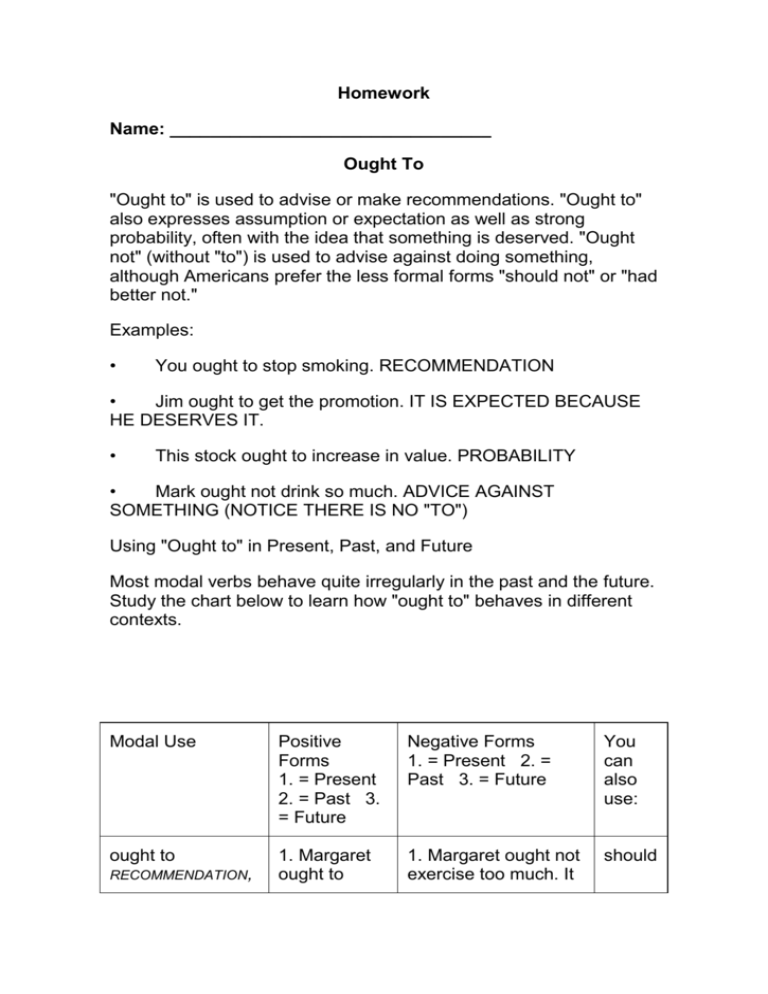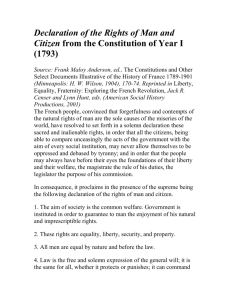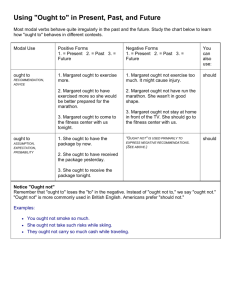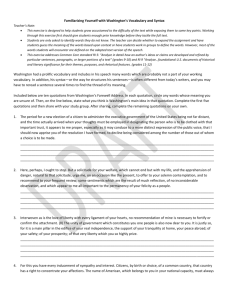general explanation
advertisement

Homework
Name: ________________________________
Ought To
"Ought to" is used to advise or make recommendations. "Ought to"
also expresses assumption or expectation as well as strong
probability, often with the idea that something is deserved. "Ought
not" (without "to") is used to advise against doing something,
although Americans prefer the less formal forms "should not" or "had
better not."
Examples:
•
You ought to stop smoking. RECOMMENDATION
•
Jim ought to get the promotion. IT IS EXPECTED BECAUSE
HE DESERVES IT.
•
This stock ought to increase in value. PROBABILITY
•
Mark ought not drink so much. ADVICE AGAINST
SOMETHING (NOTICE THERE IS NO "TO")
Using "Ought to" in Present, Past, and Future
Most modal verbs behave quite irregularly in the past and the future.
Study the chart below to learn how "ought to" behaves in different
contexts.
Modal Use
Positive
Forms
1. = Present
2. = Past 3.
= Future
Negative Forms
1. = Present 2. =
Past 3. = Future
You
can
also
use:
ought to
1. Margaret
ought to
1. Margaret ought not
exercise too much. It
should
RECOMMENDATION,
ADVICE
exercise
more.
2. Margaret
ought to have
exercised
more so she
would be
better
prepared for
the
marathon.
might cause injury.
2. Margaret ought not
have run the
marathon. She wasn't
in good shape.
3. Margaret ought not
stay at home in front
of the TV. She should
go to the fitness
center with us.
3. Margaret
ought to
come to the
fitness center
with us
tonight.
ought to
ASSUMPTION,
EXPECTATION,
PROBABILITY
1. She ought
to have the
package by
now.
"OUGHT NOT" IS USED
should
PRIMARILY TO EXPRESS
NEGATIVE
RECOMMENDATIONS.
(SEE ABOVE.)
2. She ought
to have
received the
package
yesterday.
3. She ought
to receive the
package
tonight.
Notice "Ought not"
Remember that "ought to" loses the "to" in the negative. Instead of
"ought not to," we say "ought not." "Ought not" is more commonly
used in British English. Americans prefer "should not."
Examples:
You ought not smoke so much.
She ought not take such risks while skiing.
They ought not carry so much cash while traveling.
Exercises Ought to
En el ejercicio de hoy ampliaremos los valores modales de ought to
y should más allá de la expresión o la forma de dar consejos en
inglés. Tienes que reescribir las siguientes frases utilizando la
palabra en mayúsculas (sin cambiarla).
Your score is 0%.
Some of your answers are incorrect. Incorrect answers have been
left in place for you to change.
1. My physician advised me to watch my weight. (OUGHT)
I
.
2. I'm very angry you didn't tell me you were getting married.
(SHOULD)
You
.
3. Thank you for doing the washing-up! (SHOULDN'T)
You
!
4. I think it is a good idea for you to read the newspaper daily. ('D
BETTER)
You
.
5. It was a bad idea to take that turning. (SHOULDN'T)
We
.
6. I don't think it is a good idea to watch dubbed films if you want to
learn English. ('D BETTER)
You
.
7. Your duty is to get to your office on time. (OUGHT)
You
.
8.- My physician advised me to watch my weight. (OUGHT)
I
.
9.- I'm very angry you didn't tell me you were getting married.
(SHOULD)
You
.
10.-Thank you for doing the washing-up! (SHOULDN'T)
You
!
11.- I think it is a good idea for you to read the newspaper daily. ('D
BETTER)
You
.
12.- It was a bad idea to take that turning. (SHOULDN'T)
We
.
13.- I don't think it is a good idea to watch dubbed films if you want
to learn English. ('D BETTER)
You
.
14.- Your duty is to get to your office on time. (OUGHT)
You
.
WOULD RATHER - WOULD PREFER
(preferiría)
• Si expresamos una preferencia para nosotros mismos:
would prefer + infinitivo con to + [(rather) than +
infinitivo sin to / -ing]
would rather / sooner + infinitivo sin to + (than +
infinitivo sin to)
No hay diferencia entre utilizar would rather o would sooner
aunque hoy día se oye más would rather.
I'd rather / sooner take the bus.
I'd prefer to take the bus.
(Preferiría coger el autobús.)
She'd rather / sooner not have to wait for you.
She'd prefer not to have to wait for you.
(Ella preferiría no tener que esperarte.)
Bob would rather / sooner stay at home than go to the party.
Bob would prefer to stay at home (rather) than go / going to the
party.
(Bob preferiría quedarse en casa a ir a la fiesta.)
Would they rather / sooner go to the cinema than watch a movie
on TV?
Would they prefer to go to the cinema (rather) than watch /
watching a movie on TV?
(¿Preferirían ir al cine a ver una película en televisión?)
No hay diferencia entre utilizar would rather/sooner o
would prefer (si no es la construcción gramatical).
Sin embargo cuando queremos expresar una
preferencia permanente sólo podemos utilizar
prefer:
I'd rather walk than take the bus.
I'd prefer to walk (rather) than take / taking the bus.
(Preferiría caminar a coger el autobús.)
—en este momento —
I prefer walking to taking the bus .
(Prefiero caminar a coger el autobús.)
— siempre —
• Si expresamos una preferencia en que otra persona haga algo,
entonces:
would prefer + objeto + infinitivo con to
would rather / sooner + sujeto + past
I'd rather / sooner she took the bus.
I'd prefer her to take the bus.
(Preferiría que ella cogiera / cogiese el autobús.)
She'd rather / sooner we didn't have to wait for you.
She'd prefer us not to have to wait for you.
(Ella preferiría que no tuviéramos / tuviésemos que esperarte.)
Bob would rather / sooner Jim stayed at home.
Bob would prefer Jim to stay at home.
(Bob preferiría que Jim se quedara /quedase en casa.)
Would they rather / sooner the children had gone to the cinema?
Would they prefer the children to have gone to the cinema?
(¿Preferirían que los chicos hubieran / hubiesen ido al cine?)
Exercises Would rather
1. We would rather you
where the nearest hotel is.
2. He would rather
money.
3.
(allow) us to stay than
(save) up than
(show)
(spend) all his
We would rather
(read) the article now by ourselves than
(listen) to your retelling.
4. They would rather she
(make) her own mistakes in her test
tomorrow than
(do) the work for her.
5.
They would rather I
(help) me.
(shovel) the snow on my own, than
6. She would rather
(make) her own exercises than
the ones that are wrongly made.
7. The boy would rather his teacher
than
(flatter) to her all along.
(use)
(give) him a bad mark
8. My mother would prefer
(send) me to study abroad
rather than
(waste) my time on inferior education.
9. The students would rather
(study) the same thing over and
over again than
(get) bad marks in their tests.
10. The pilot would rather the terrorists
(get) what they
demanded than
(threaten) the passengers.








